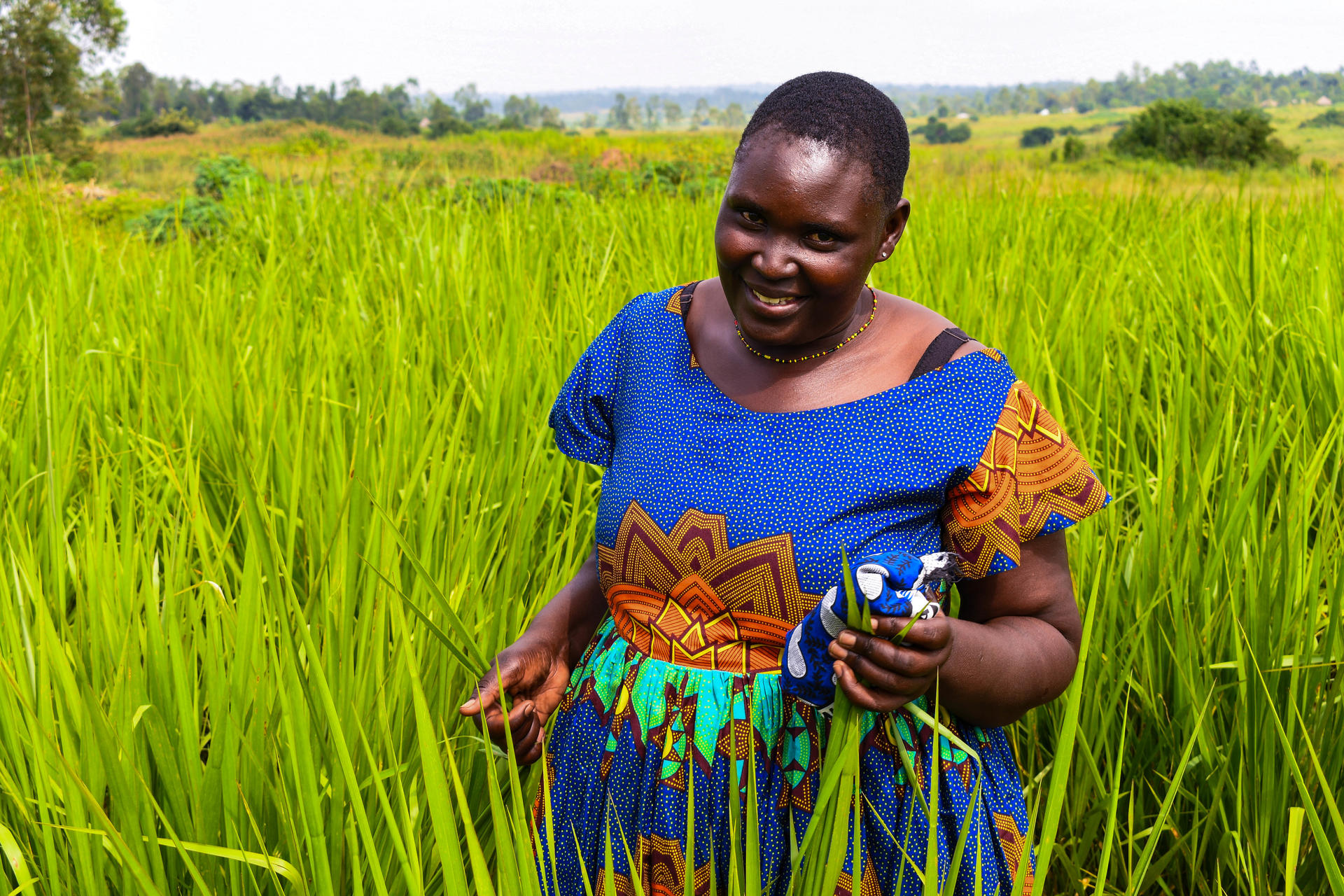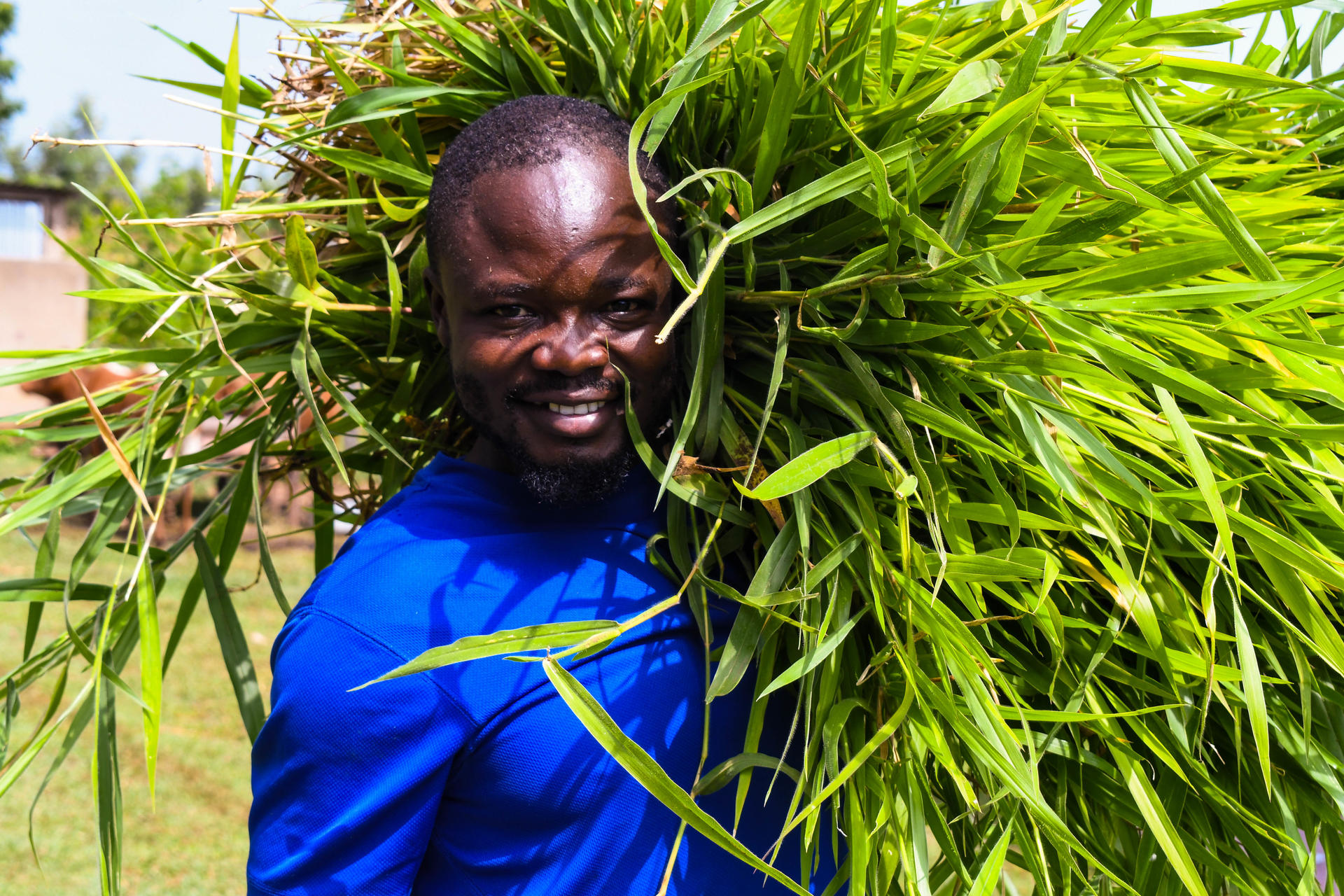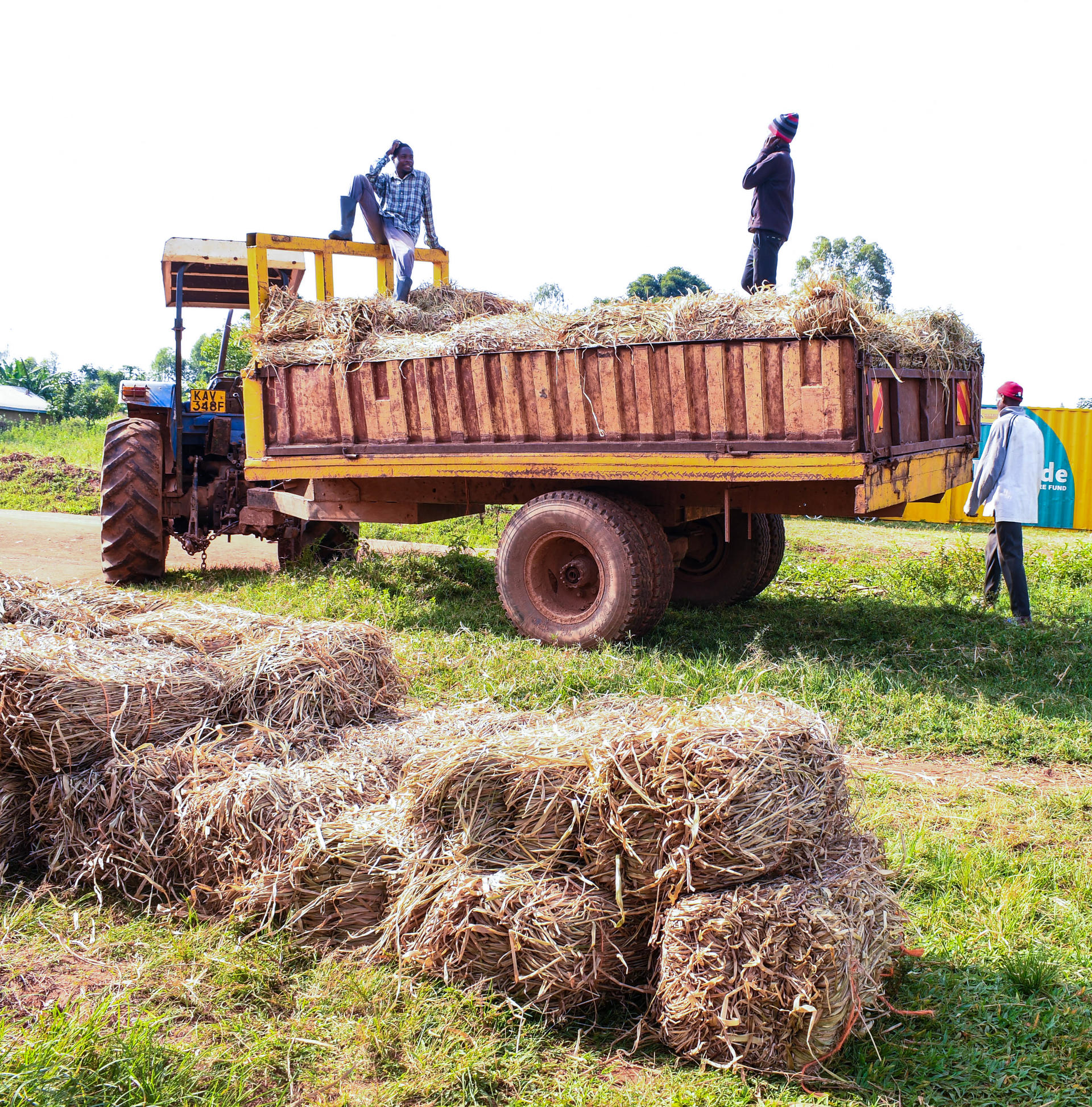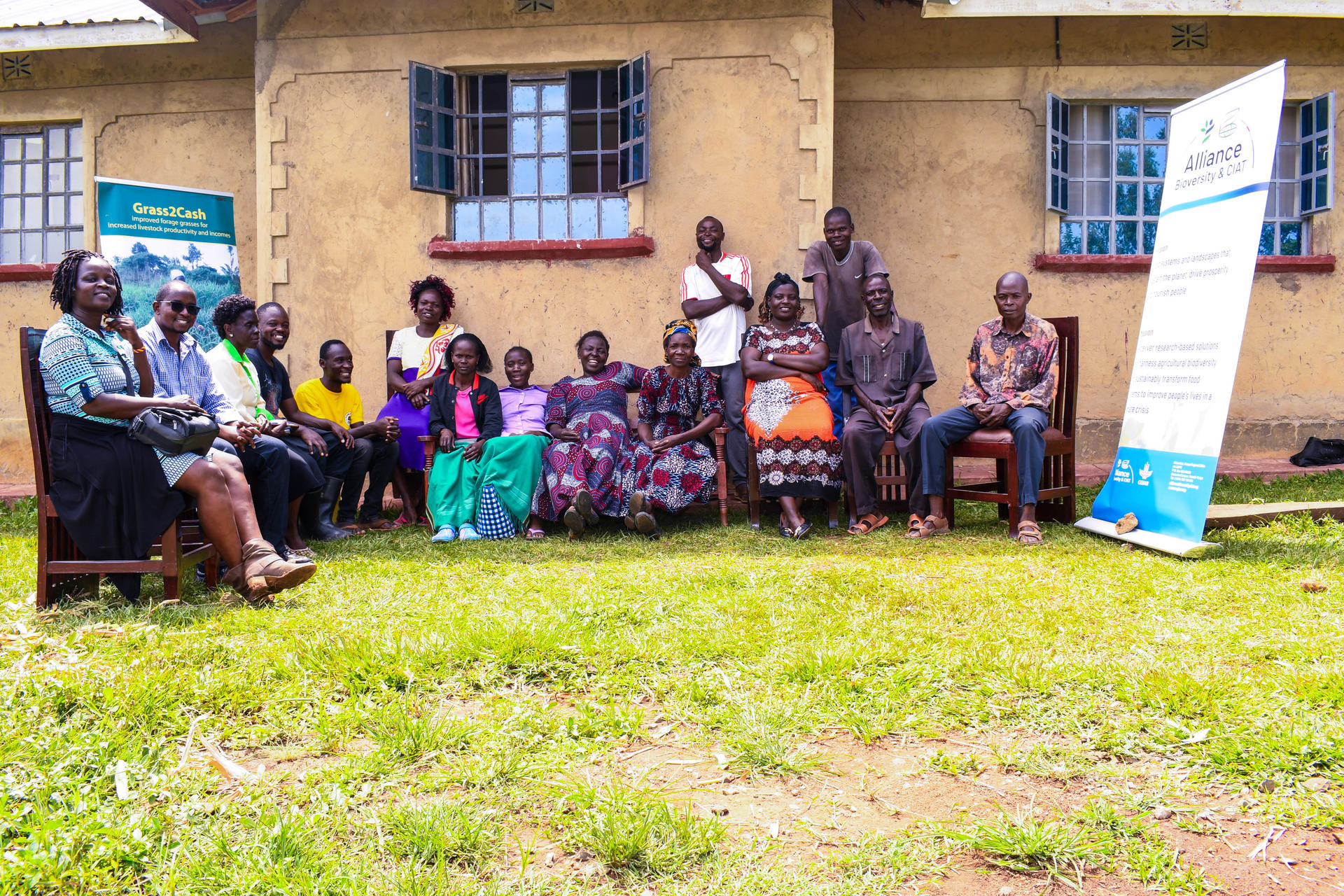Blog Empowering Youth and Women through Forage Business in Western Kenya: Lessons from the Grass2Cash Project

By Kenneth Waluse, Ruth Odhiambo,
An Notenbaert and Owen Kimani
Whereas agriculture is identified as a key sector to deliver economic growth in the Kenyan vision 2030, the youth are not effectively tapping into the employment and livelihood opportunities provided through agriculture. Some reasons for their low participation in agribusiness activities include the negative perception about agriculture, limited farming knowledge, and difficulties accessing land and capital for investment since many of the young people lack collateral to access loan. The Alliance of Bioversity and CIAT, through the Grass2Cash project seeks to change the narrative by building the capacities of youth and women groups and supporting them to engage in commercial forage production.
Agriculture is a key sector in the Kenyan economy with 33% of the country’s Gross Domestic Product (GDP) directly created through agriculture. At least 40% of the total employment, and 70% of the employment opportunities in the rural areas are provided by this sector (FAO, 2023).
At the same time the larger proportion of the country’s population are youth (18-35 years), and 80% of the currently unemployed are young people (MoA, 2018; RoK, 2019). Female youth are disproportionately affected. According to the World Bank database, 24% of female youth are not meaningfully engaged in employment or training, compared to 15% among male youth (World Bank, 2023).
Whereas agriculture is identified as a key sector to deliver economic growth in the Kenyan vision 2030, the youth are not effectively tapping into the employment and livelihood opportunities provided through agriculture (MoA, 2018). Some of the reasons for their low participation in agribusiness activities include the negative perception about agriculture, limited farming knowledge, difficulty accessing land, and capital for investment since many of the young people lack collateral to access loans (RoK, 2019). As such, the need to create new employment opportunities, especially in rural areas, and to empower the youth of either gender to take advantage of those opportunities cannot be overemphasized.

The Grass2Cash (@scale) Project
The Grass2Cash project is a scaling initiative aimed at enhancing livestock productivity in East Africa by promoting the adoption of improved forages among smallholder farmers. The project's goal is to disseminate knowledge on forage production and reach 100,000 dairy farmers, with 30,000 adopters by 2024. A crucial aspect of achieving this goal is supporting forage businesses to thrive.
These forage business groups play a pivotal role in scaling up the project's impact by providing high-quality planting materials and conserved fodder to livestock farmers. Additionally, they have the potential to share the knowledge and forage technologies gained with other producer groups and customers beyond the project's initial areas of focus. The forages being promoted include Brachiaria hybrids (Mulato II, Cayman, Cobra and Camello), Brachiaria cultivars (Xaraes, Basilisk), Panicum maximum (Mombasa, Masai, Tanzania), forage legumes (Crotalaria Sunhemp) among others.
Project Details
| Project name | Improved forage grasses: Bringing their integration into humid- to sub-humid livestock production systems to scale |
| Short name | Grass2Cash(@scale) |
| Funded by | German Federal Ministry for Economic Cooperation and Development (BMZ) |
| Project regions | Kenya (Kakamega, Bungoma, Busia, Siaya, Uasingishu; Meru), Uganda (western region) and Ethiopia |
| Lead partners | Alliance Bioversity-CIAT, Ripple Effect, Kenya Agricultural & Livestock Research Organization, SNV-Uganda, ILRI-Ethiopia, U-farm holdings, Advantage Crops Ltd., GIZ, Yielder, Meru Dairy Cooperative Union, and Dairy cooperatives in Kakamega and Uasin-Gishu counties, of Kenya. |
| Target goal | Reach 100,000 dairy farmers, with 30,000 adopters by 2024 |
| Duration | 04/2021 – June 2024 |
The Intervention: Empowering Youth and Women

To stimulate the forage market, empower women farmers, and create employment opportunities for the youth, the project has taken several measures:
- Recruiting 15 youth and women groups in Western Kenya.
- Providing practical forage production and agribusiness training through village-based trainers in a farmer-field school approach.
- Supplying starter seeds to these groups.
- Linking them to financial institutions.
- Connecting them with buyers through established networks.

Achievements and Stories from the Field
This initiative, aimed at improving livestock productivity through the adoption of enhanced forages, has not only been a beacon for smallholder farmers but has also transformed the lives of the youth and women in the area. Here are some remarkable highlights from the project's journey so far:
- Recruiting and Empowering Communities: Fifteen groups from Kakamega, Bungoma, Busia, Siaya, Elgeyo Marakwet, and Trans-nzoia counties joined the project in 2022. These groups became the bedrock of the Grass2Cash youth initiative, displaying their commitment to embracing change and empowering themselves.
- Building Capacity: Knowledge is indeed power, and Grass2Cash recognized this fact. In its mission to uplift these communities, the project trained ten village-based trainers across the six counties. Through training-of-trainers sessions and access to the invaluable Tropical Forages training manuals, these trainers became the torchbearers of knowledge, disseminating the secrets of successful forage production.
- Empowering Through Education: Practical training became the cornerstone of empowerment. An astounding 350 active members underwent comprehensive training in various aspects of agribusiness. Topics ranged from forage production and conservation to marketing, maintaining product quality, ensuring customer satisfaction, and fostering business growth and sustainability. Participants also delved into sources of finance, crucial regulations, and the intricate processes of seedling nursery certification.
- Sowing Seeds of Transformation: The commitment to change was more than just words. Members of the participating groups rolled up their sleeves and planted different forage varieties on their farms. They used planting materials from project-established demonstration plots, transforming themselves from passive learners into active contributors. Today, they proudly sell hay and forage planting materials, with unwavering support from project staff and trainers.
- Financial Empowerment: Recognizing the importance of financial literacy and stability, all the groups were linked to the Equity Group Foundation. This partnership aims to provide additional training on financial management and group dynamics, making their agribusinesses sustainable and attractive to potential lenders.
- Unlocking Opportunities: Government and Development Support: The impact of the Grass2Cash project rippled through the community, attracting attention and support from county governments and development projects. Notably, the 'Musikoma Rural Youth Group' and the 'Ndengelwa Youth Uplift Group' received recognition for their efforts and were selected to supply tree and forage seedlings to other farmers supported by CREADIS.
- Transformation in Action: Through these concerted efforts, the Grass2Cash project has witnessed a remarkable transformation in the livelihoods of the youth and women in western Kenya. By imparting knowledge, creating marketing networks, and establishing links to lenders for saving and credit solutions, the project has not only empowered these communities but also stayed true to its broader goal of improving livestock productivity.
Acknowledgement
The success of this intervention is a collective effort. We extend our heartfelt thanks to the group members, dedicated trainers, project staff, and colleagues at the Alliance for their invaluable contributions. Together, we are forging a brighter future for youth and women in the agricultural landscape of Western Kenya.
More information about the groups
- Lwanja classified youth group – Bumula constituency, Bungoma county (+254 740-869895)
- Save one around youth group – Bumula constituency, Bungoma county (+254 701-310982)
- Nangata youths in action self-help group – Bumula constituency, Bungoma county (+254 700-038678)
- Musikoma rural youth group – Kanduyi constituency, Bungoma county (+254 713-707717)
- Ndengelwa youth uplift group – Kanduyi constituency, Bungoma county (+254 700-911826)
- Matayos dairy farmers cooperative society (MDAFCOS) – Matayos constituency, Busia county (+254 725-586749)
- ICIPE jiinue self-help group – Matayos constituency, Busia county (+254 720-615954)
- Amkeni women group – Matayos constituency, Busia county (+254 792-753663)
- Equitalk citizen organization – Mumias-east constituency, Kakamega county (+254 733-480747)
- MIM multipurpose CBO – Mumias-east constituency, Kakamega county (+254 701-057314)
- Shironyanga women group – Navakholo constituency, Kakamega county (+254 704-230231)
- Tuinuane farmers field school – Cherangany constituency, Trans-nzoia county (+254 714-907644)
- Masiro farmers CBO – Ugenya constituency, Siaya county (+254 717-458294)
- Chepkorio dairy youth council – Keiyo South constituency, Elgeyo Marakwet county (+254 723-015985)
- Moita self-help group – Elgeyo Marakwet county (+254 722-562736)
